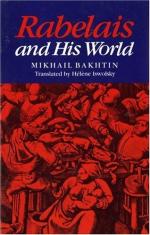
|
| Name: _________________________ | Period: ___________________ |
This quiz consists of 5 multiple choice and 5 short answer questions through Chapter 13, Chapter 5 - The Grotesque Image of the Body Concludes and Chapter 6 - Images of the Material Bodily Lower Stratum.
Multiple Choice Questions
1. In which twentieth-century movement was the grotesque especially evident?
(a) Modernism.
(b) Impressionism.
(c) Futurism.
(d) Expressionism.
2. Mikhail Bakhtin is:
(a) A vocal Eastern Orthodox cleric.
(b) A fictional figure created to be the mouthpiece of an anonymous author.
(c) The most famous Russian writer ever.
(d) A somewhat mysterious but increasingly interesting literary figure.
3. What event that Rabelais relates does he assert is the origin of the name of the city of Paris?
(a) Pantagruel's education in the druggists' shops.
(b) A battle won by the French against the English.
(c) An earthquake that disrupts Carnival.
(d) Gargantua's drenching of the city in urine.
4. In the folklore and grotesque realism of Rabelais' works, excrement represents bodies and matter that are:
(a) Frightening and terrible.
(b) One with the earth.
(c) Generally revered.
(d) Mostly comic.
5. After Rabelais' time, the use of laughter in literature and culture moved in which direction?
(a) From singular to universal.
(b) From universal to restricted.
(c) From accepted to encouraged.
(d) From spiritual to earthly.
Short Answer Questions
1. In the example Schneegans offers, what does Rabelais' Friar John assert makes women fertile?
2. Which side of the Renaissance debate about the nature of women and wedlock did Rabelais tend to take?
3. From what does Panurge suggest the protective walls of Paris be built?
4. Which aspect of Renaissance culture does Bakhtin stress is still apparent in Western society today?
5. What does the "form" of any kind of art express?
|
This section contains 293 words (approx. 1 page at 300 words per page) |

|




